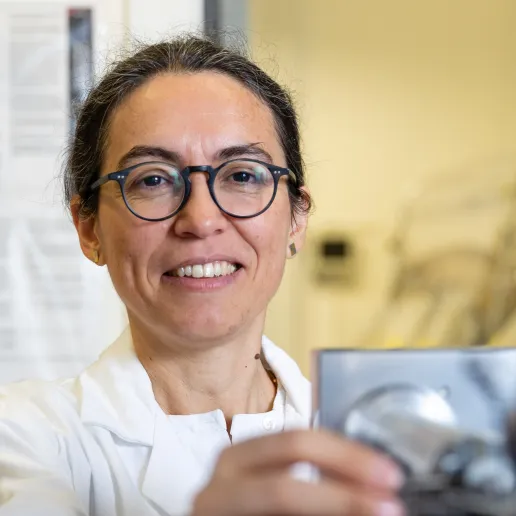EXC 2008: Unifying Systems in Catalysis (UniSysCat)
Facts
Molecular Chemistry
Physical Chemistry
Basic Research in Biology and Medicine
DFG Excellence Strategy Cluster
Description
The central scientific objective of UniSysCat (Unifying Systems in Catalysis) is to master the next stage of future challenges in catalysis: how to elucidate, create, and control reaction networks in chemical and biological catalysis at different levels of complexity in space and time. The systems targeted by UniSysCat cover various coupled catalytic and non-catalytic processes that fail to work or cannot be controlled if their key parts are spatio-temporally apart. Since coupling of catalytic reactions requires a comprehensive understanding of the elementary steps as well as the nature and dynamics of the catalytic sites, UniSysCat’s research program takes advantage of cutting-edge achievements of the internationally renowned centre for research in chemical and biological catalysis, Unifying Concepts in Catalysis, UniCat, including an indispensable tailored toolbox of experimental and theoretical methods. UniSysCat’s research program consists of five interconnected research areas that are defined by distinct combinations of various chemo- and biocatalytic cycles, (non-catalytic) ground state electron transfer, and excited state reactions. Links between these areas are established by elucidating overarching concepts in chemical and biological catalysis based on a proven interdisciplinary approach and similar methodologies. The research program benefits from synergistic effects generated by local, national, and international collaborations with renowned consortia and institutions that will be further developed toward a network of research networks. The main structural objective of UniSysCat is to further strengthen catalysis as a research priority in Berlin. We will extend sustainable measures established within UniCat including the dedicated appointment of professorships at the participating institutions. Main efforts are directed to promote young researchers. The successful international and interdisciplinary Graduate School BIG-NSE will continue under the roof of the Einstein Center of Catalysis, funded by the Einstein Foundation Berlin, while UniSysCat will increase efforts to promote career development above the PhD level. In parallel, we will strive for attracting excellent young scientists from the outside for junior research group leader positions, with a view towards integrating them into a tenure track program. This option will encourage more women to pursue an academic career as part of our multifaceted measures to promote gender equality. Furthermore, UniSysCat will put a strong focus on creating a new culture to enable more young graduates to start their own enterprises. As an unparalleled sustainable measure, the Senate of Berlin and Technische Universit?t Berlin will establish the Chemical Invention Factory (CIF) in a new building in 2018. CIF will constitute a unique infrastructure to open non-academic career pathways and will add a new dimension to the transfer of knowledge, complementing the existing UniCat BASF joint lab BasCat.
Topics
Spokesperson
Participants
- Person
Prof. Dr. rer. nat. Janina Kneipp
- Mathematisch-Naturwissenschaftliche Fakult?t
- Institut für Chemie
 Person
PersonDr. rer. nat. Berta Maria Dias Pereira Martins
- Lebenswissenschaftliche Fakult?t
- Institut für Biologie
- Person
Dr. Matthias Schwalbe
- Mathematisch-Naturwissenschaftliche Fakult?t
- Institut für Chemie
- Person
Prof. Dr. Kallol Ray
- Mathematisch-Naturwissenschaftliche Fakult?t
- Institut für Chemie
- Person
Prof. Dr. Thomas Braun
- Mathematisch-Naturwissenschaftliche Fakult?t
- Institut für Chemie
- Person
Prof. Stefan Hecht, Ph.D.
- Mathematisch-Naturwissenschaftliche Fakult?t
- Institut für Chemie
- Person
Prof. Dr. rer. nat. Holger Dobbek
- Lebenswissenschaftliche Fakult?t
- Institut für Biologie
- Person
Prof. Dr. Dr. h. c. Peter Hegemann
- Lebenswissenschaftliche Fakult?t
- Institut für Biologie
Organization entities
Department of Biology
Address
Institutsgeb?ude/Hauptgeb?ude, Invalidenstra?e 42 (Hauptgeb?ude), 10115 Berlin
More locations
Partners
- Cooperation partnerUniversityGermany
Charité – Berlin University Medicine
- Cooperation partnerUniversityGermany
Free University of Berlin
- Cooperation partnerNon-university research institutionGermany
Fritz Haber Institute of the Max Planck Society
- Cooperation partnerNon-university research institutionGermany
Helmholtz Center for Materials and Energy
- Cooperation partnerNon-university research institutionGermany
Leibniz-Forschungsinstitut für Molekulare Pharmakologie
- Cooperation partnerNon-university research institutionGermany
Max Planck Institute of Colloids and Interfaces
- Cooperation partnerUniversityGermany
University of Potsdam
Child projects
- ProjectDFG Excellence Strategy Cluster01/2019 - 12/2020
EXC 314/1 AG Kneipp
Project management: Prof. Dr. rer. nat. Janina Kneipp
- ProjectDFG Excellence Strategy Cluster01/2019 - 06/2022
EXC 314/1: AG Hecht
Project management: Prof. Stefan Hecht, Ph.D.
- ProjectDFG Excellence Strategy Cluster01/2019 - 12/2022
EXC 314/1: AG Martins – Structural Analysis of (Metallo)Enzymes
Project management: Dr. rer. nat. Berta Maria Dias Pereira Martins
- ProjectDFG Excellence Strategy Cluster01/2019 - 12/2022
EXC 314/1: Carbonylation of Alkanes (AG Braun)
Project management: Prof. Dr. Thomas Braun
- ProjectDFG Excellence Strategy Cluster01/2019 - 12/2022
EXC 314/1: Elucidation of the photo-assembly mechanism of the native and modified water oxidation catalysts in photosystem II Biocatalytic coupling of photosystem I with FDH and CODH supercomplexes
Project management: PD Dr. Athina Zouni
- ProjectDFG Excellence Strategy Cluster01/2019 - 03/2022
EXC 314/1: The Activation of Small Molecules With Cofacial Heterodinuclear Metal Catalysts of the Pacman Type
Project management: Dr. Matthias Schwalbe

